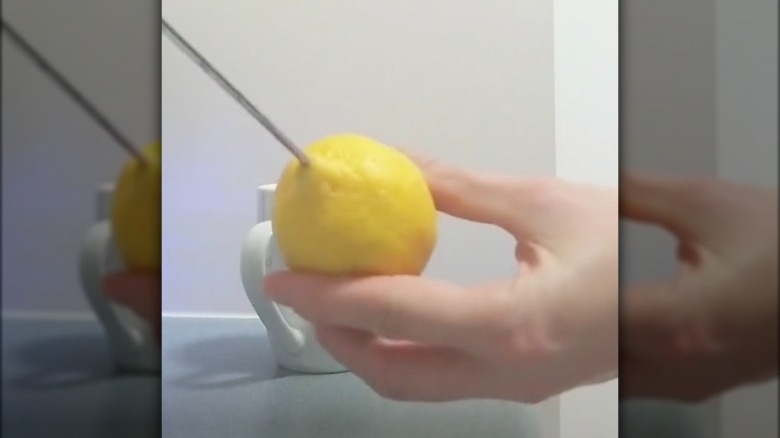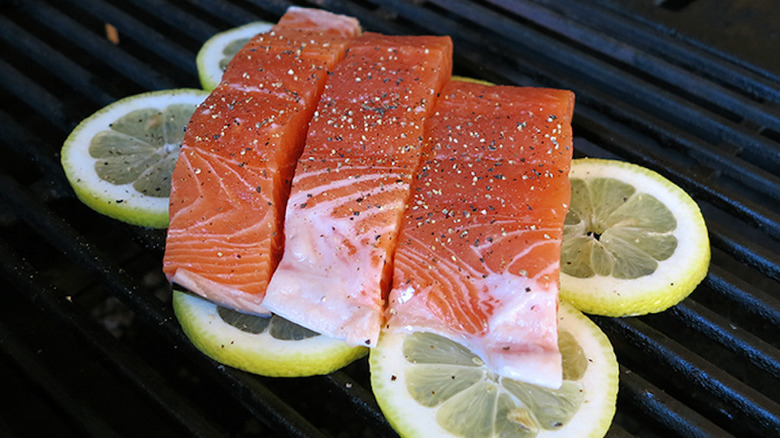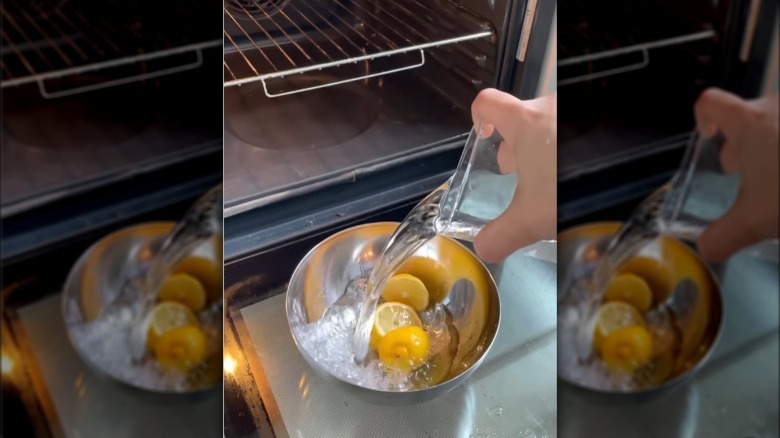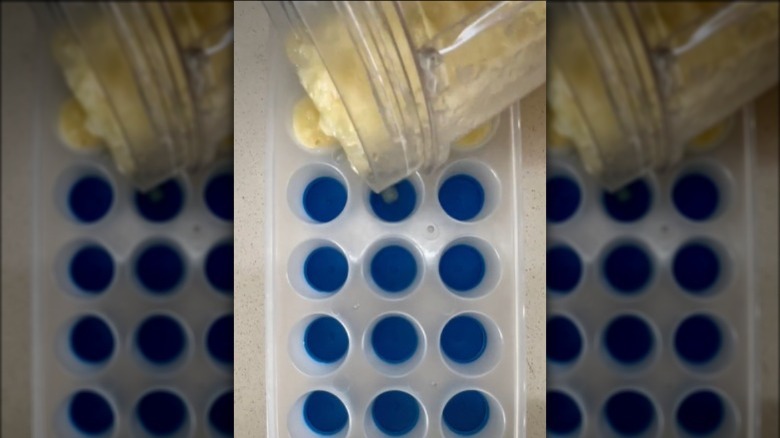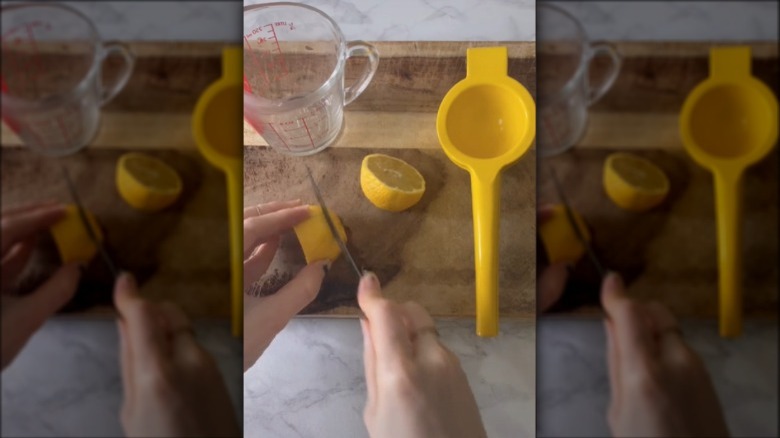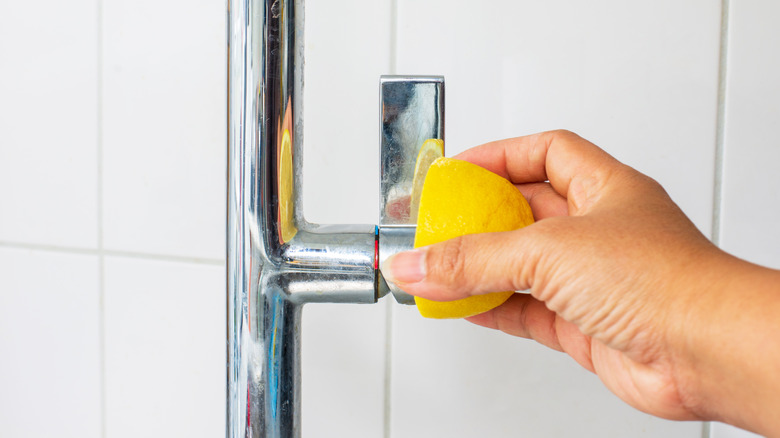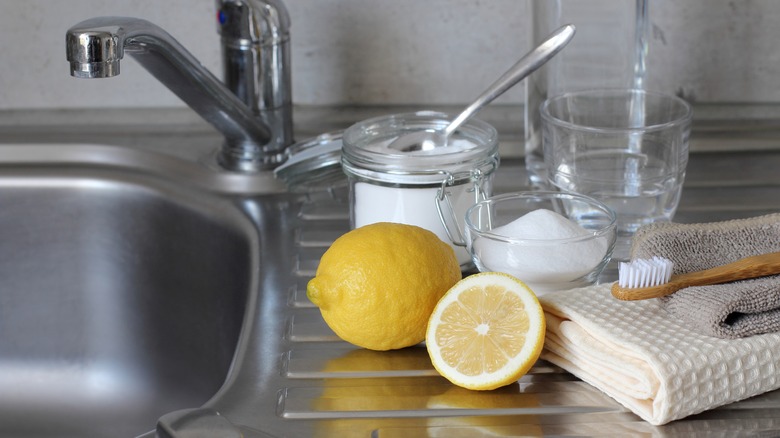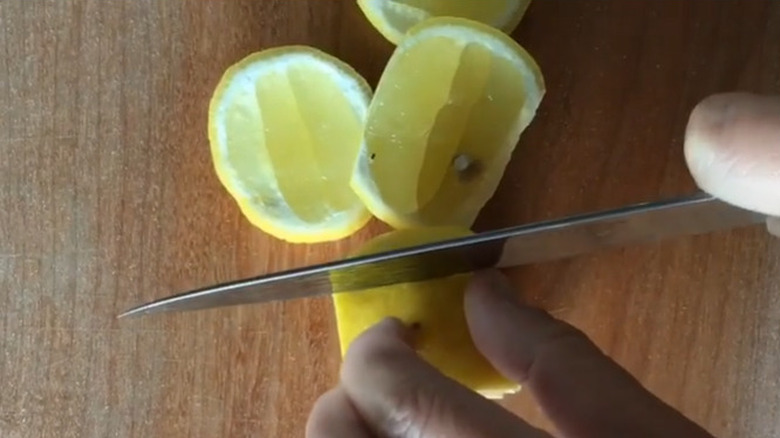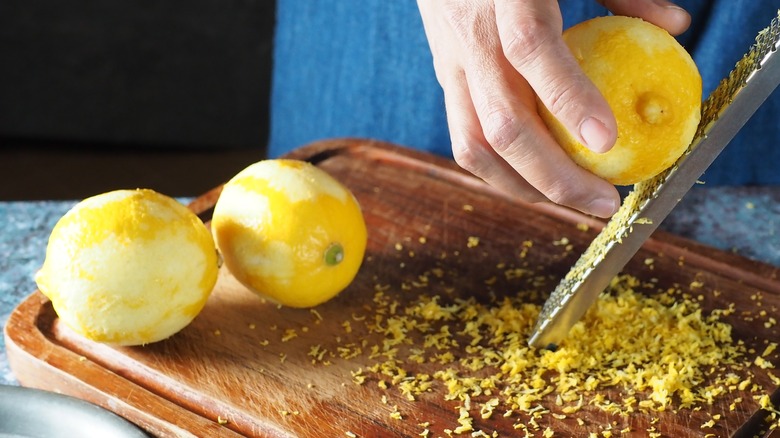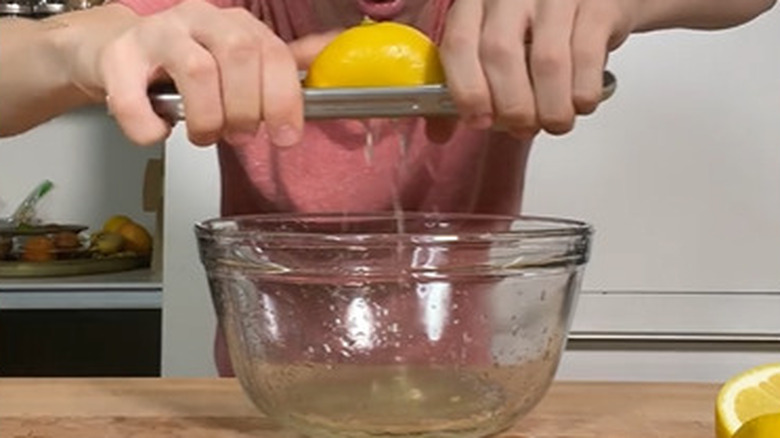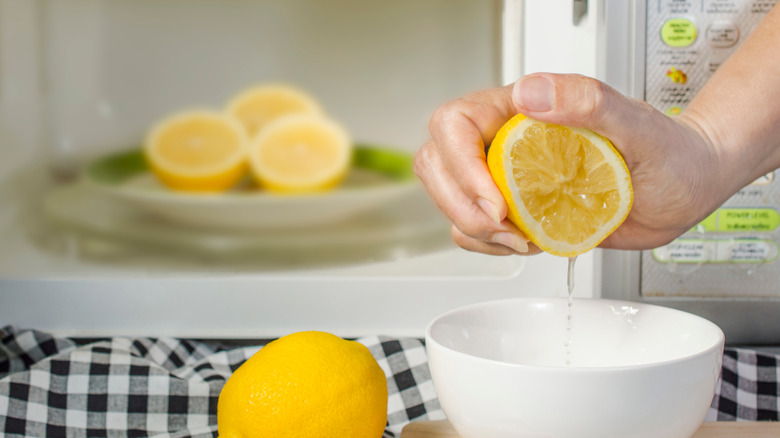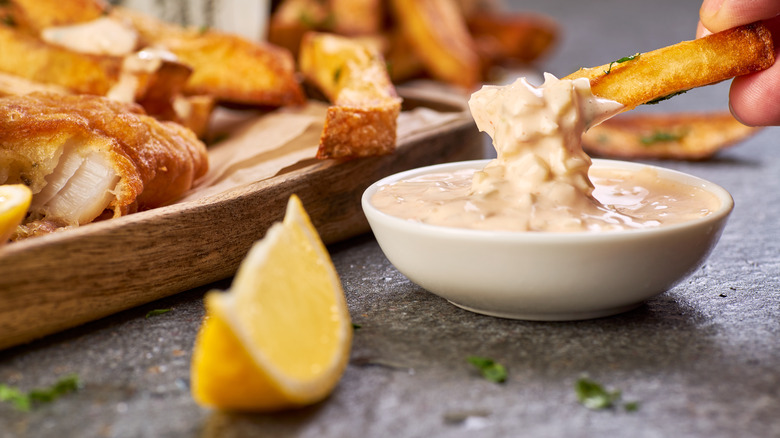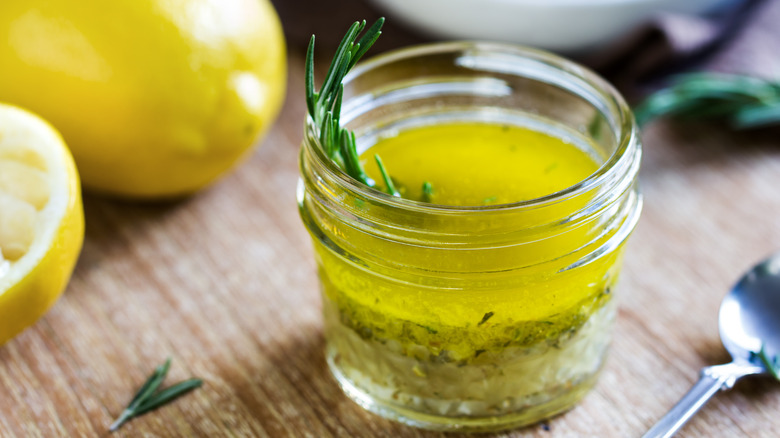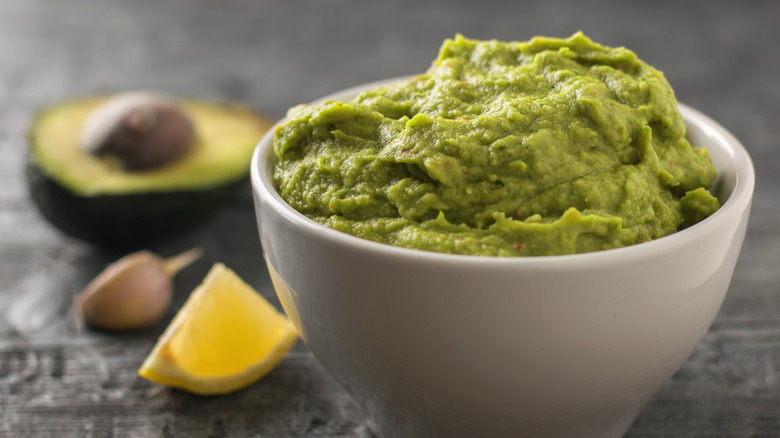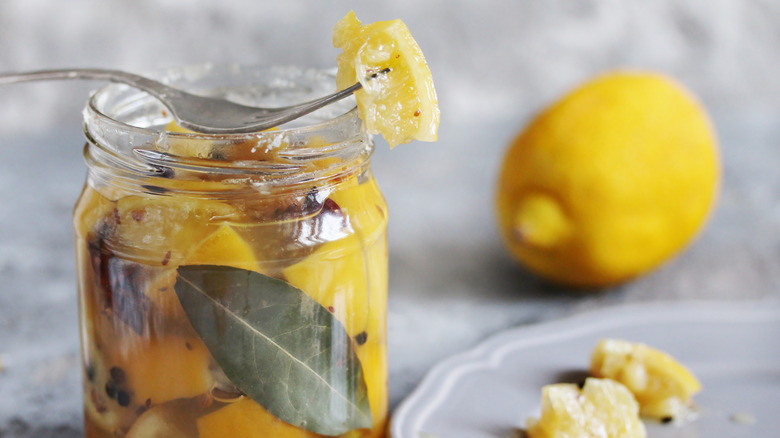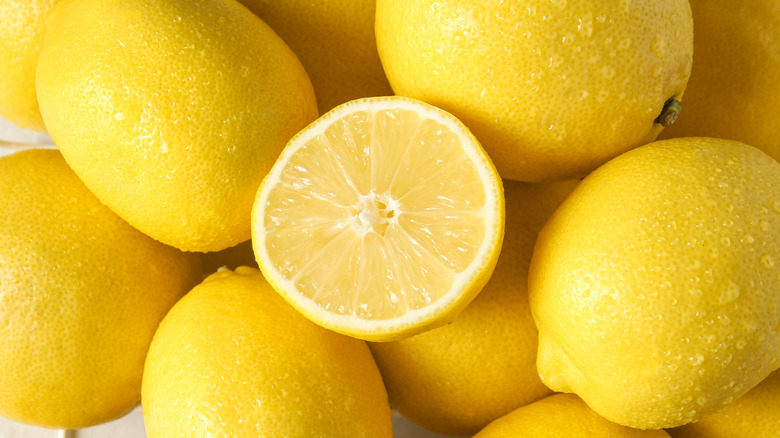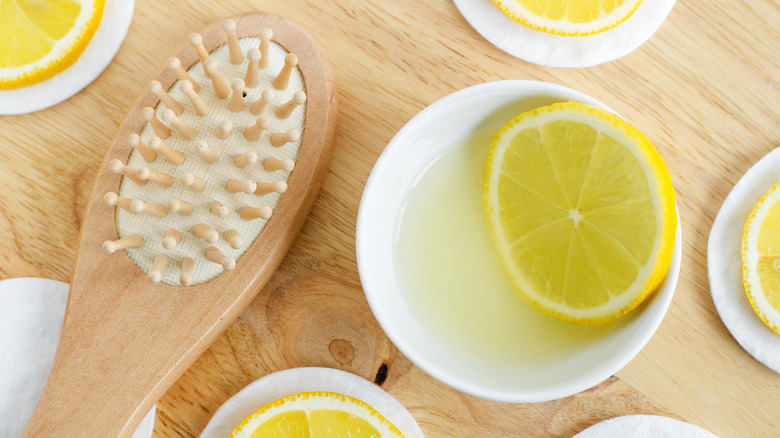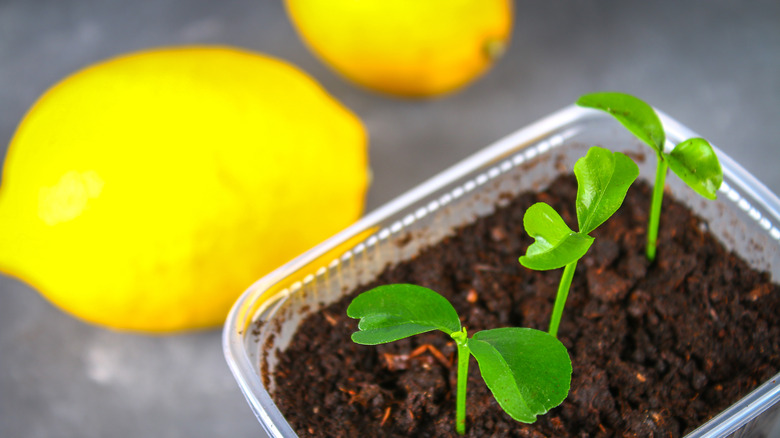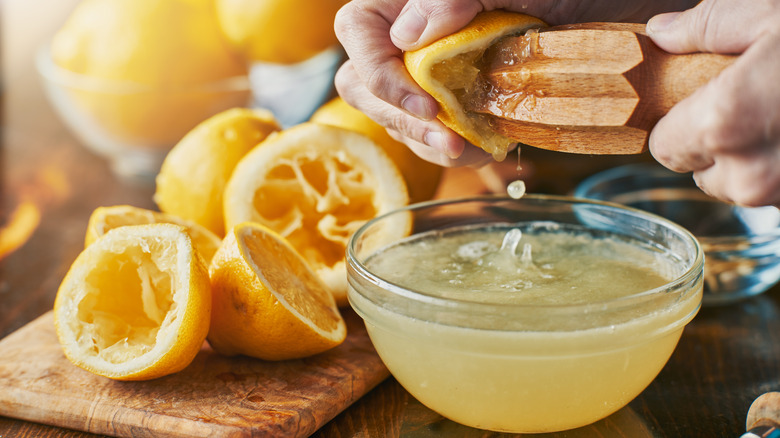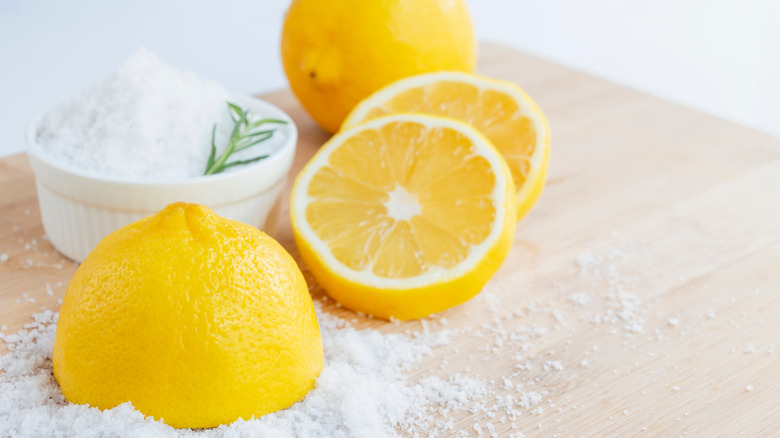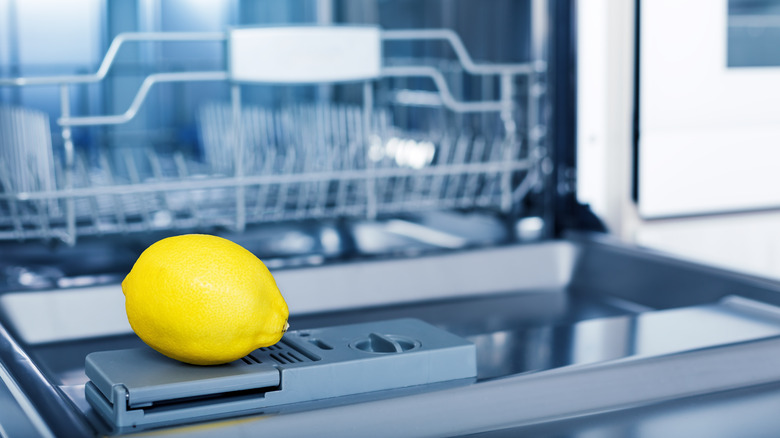28 Lemon Hacks You Need To Know
Lemons are a kitchen essential, as a cooking ingredient and much more. Did you know that California and Arizona grow 95% of the lemons in the U.S.? And that's a lot of lemons, since the average adult in the U.S. consumes 13 pounds of lemons per year. Of course, there's a lot of lemons to choose from — roughly 50 varieties, all harvested by hand, according to the Arizona Farm Bureau. The tangy, citrus, and sour taste of lemons makes them perfect for adding to savory and sweet dishes, and they can be found in cuisines across the globe, making them a must-have in any kitchen. Plus, you can use every part of a lemon, from the peel and zest to the pulp and juice.
From how to best juice a lemon, to cutting it in the best way so it doesn't squirt in your face during dinner, to making lemonade taste even better, there's a hack for just about everything when it comes to lemons. The possibilities with this fruit are endless — preserve them, roast them, use them as a garnish, enhance the most unlikely of dishes, even use them to make your kitchen shine. And when you're finished juicing, cooking, and cleaning with lemons, you may find time to use a lemon on your hair, too. Read on for all the zesty tips and tricks you need to know.
Squeeze a lemon with a skewer
Here's a conundrum for you: How do you squeeze a lemon so that you get all the juice, without any pith or pips? And without using a knife to cut into it. The simple and amazing answer — use a skewer. What's even better than food hacks, are food hacks that work so darned well and are so straightforward that you just know they're going to become an absolute go-to. The bigger question is whether you'll squeeze a lemon any other way than this next time you're cooking with citrus.
As demonstrated on Facebook by Whole Approach Nutrition, start by rolling your lemon on a countertop so that you break down the cells of the fruit inside. Take your lemon and push a skewer through the end that sticks out, making sure that you don't go all the way through and out the other side. Once the skewer is pretty far in, move it around so that you're breaking up the flesh of the lemon a little more from the inside. Then take the skewer out, hold the lemon over a cup with the hole facing downward, and start squeezing. You should get a fairly steady stream of juice coming out, without any seeds or fleshy bits, and without having to push on the fruit too hard, either.
Use lemon slices for a cookout
The idea of cooking a delicate piece of fish on the grill is so appealing. A barbecue adds a fantastic smoky element and a mouthwatering depth of flavor to seafood. But before you fire up the flames, consider this – if you put your fillet straight on the iron, it'll possibly stick to the grill. Instead of gently lifting off a succulent fish from your barbeque and biting into a beautifully presented dish, you may have to scrape the flesh off a hot grate, with flaking fish possibly falling down into the coals. Once you do get most of it off, what remains is going to burn, smell unpleasant, and taint any food you throw on the grill afterward.
One easy solution is to grill your fish on lemon slices (via Lifehacker). Start by slicing your lemons and placing them on the bars of your grill before laying your fish directly on top. This provides a steady base, and since lemon and fish go so well together, it boosts the flavor of the seafood, too. If you have a large piece of fish then make sure to use a lot of slices that are arranged relatively close together, to ensure the flesh cooks evenly. If you're grilling small portions, a couple of lemon slices should suffice. Bonus: You can use this method for cooking in the oven, too.
Clean your oven with lemons
Who doesn't love an ingenious kitchen cleaning tip? This one, posted on Instagram, offers a splendidly simple way to make the arduous task of cleaning your oven far easier. Yes, it does take some time, but it's designed to take out the elbow grease, and lessen the amount you have to scrub away at burnt-on fat and foods that inevitably build up over time. Unlike some other so-called hacks, this one doesn't require any expertise or expert equipment. All you need are some lemons, an ovenproof bowl, and some water.
Start by preheating your oven to 400 F (or 200 C). Roughly slice some lemons and add to your bowl and fill with water. Once you're oven is up to temperature, put your lemon water in and let this warm up for 20 minutes. Turn off your oven and leave the bowl inside so it can cool down for a few minutes. You want the water to be warm, but not boiling hot. Dip a cloth into the bowl and start wiping your oven, letting the lemon water work its cleaning magic inside and out.
Cook with frozen lemon bites
Lemon juice is something of a kitchen ingredient staple when you think about it. It's used in so many recipes, and features in savory and sweet dishes. You'll need lemon juice if you want to cook up some grilled shrimp as an appetizer. It's also part of the recipe for making meaty dishes such as lemon chicken, and of course, delicious citrus desserts like lemon meringue pie. However, fresh lemons only last so long, even in the fridge. Same goes for freshly squeezed lemon juice, too. Why not make some frozen lemon bites to add more than juice to recipes?
As posted by a crafty TikTok user, start by peeling some lemons and throwing them into a blender. Blend them until the fruity pulp is smooth. Fill an ice cube tray up with the pureed fruit and freeze. Once your lemon bites are frozen, take them out of the tray and store the batch in a sealable bag in the freezer. Use the cubes to add to smoothies and when baking or cooking. Use them when making drinks, too. By including the pulp, you're adding fiber into recipes and extra nutrition beyond what you get from just lemon juice.
Use your handheld juicer more effectively
This may come as a surprise, but you could be using your handheld juicer incorrectly. "How is that even possible?" you might ask. After all, don't you just cut a lemon in half, for example, place it into the bottom half, and press down the top half so it squashes the fruit? Well, the answer is yes and no, according to a hack posted on TikTok. If you're used to putting the lemon half into the juicer with the peel side down, so it fits in the bottom part, then you're doing it half right. This hack suggests making a simple extra cut in your lemon before you juice it to make all the difference.
Cut your lemon in half. Before you put it in the juicer, rounded side down, you need one extra step. Slice off the other end of the lemon half. That way, both ends are flat and reveal the lemon flesh inside. When you squeeze down the juicer, the juice now has somewhere to escape to. And if you've been putting lemons in your juicer cut side down as some people do, this hack can still help maximize the juice you get of them.
Eliminate fish odors with lemon
Cooking with fish can be a lot of fun because there are so many amazing dishes to make. You could serve a sophisticated sea bass with a garlic, lemon, butter sauce or a baked mahi mahi with lemon seasoning. Whatever seafood delight you decide on, two factors are clear. The first is that lemon complements fish perfectly. And second, when you're cooking with fish, it definitely leaves an odor on your hands and prep boards which can smell quite unpleasant as it lingers.
A great trick is to not just use your lemon for your recipe — use it to cancel fishy odors as well. According to Tastessence, fishy smells are caused by compounds called amines being released from fish into the air. The acidity of lemons reacts with the alkalinity of these compounds, creating ammonium salts which do not permeate and cause a stink. That covers the science part, so now you need to know what to actually do. Remove odors by literally rubbing your fingers with a lemon wedge along with some salt. If you've been eating fish and using your hands, then wash your hands with lemon juice. You can also use lemon peels to rub knives with if you've been cutting a fish fillet, and worktops can be cleaned with a lemon juice and water spray.
Add a burnt lemon wedge to your sidecar cocktail
You may have come across or tasted plenty of cool cocktails topped with a twist or wedge of lemon. However, lemon isn't just good for a pop of color and a pretty garnish. It can really add some extra taste to a boozy concoction, adding a wonderful lemony twist. And if you really want to take things to the next level, you could try a Tasting Table hack designed to release an intense lemon flavor.
Say you want to craft a perfectly shaken sidecar cocktail, and you've mixed lemon juice with cognac and Cointreau, but you just want that little something extra. Once you've poured it from the shaker into a glass, use a lighter to lightly char a piece of lemon peel before squeezing it and adding it to your cocktail. The peel contains oil, and by warming it up, you're creating a more robust release of these citrus oils. Because of the sourness of lemon, a sugared rim balances the flavor profile of this drink in particular. Of course, you'll need a lemon for this, too, running it around the edge of your glass before dipping it into the sugar.
When life gives you lemons, make roasted lemonade
Lemonade is undoubtedly a summer thirst quencher, although you can enjoy it any time of year. In general, you make this classic drink with lemon juice, water and sugar, while recipes may vary slightly. You can also try a really great trick to up the flavor of your lemonade by roasting your lemons first.
Halve your lemons and lay them on a baking tray cut side down. Roast in the oven for 20 to 30 minutes at 400 F. Once they're done, let the lemons cool down before you juice them. Then proceed to follow whatever lemonade recipe you like. According to Lifehacker, roasting lemons gives your lemonade a subtly smokey and far more complex and rich taste. But keep in mind that roasting lemons caramelizes them, which also enhances the sweetness. This means that you won't necessarily have to add as much sugar as you would if you were using lemons that hadn't been in the oven.
Use a lemon to clean your faucet
Do you have a dirty faucet? Hard water buildup can be quite difficult to remove, even if you scrub away at the unsightly deposits. While you may have a whole cupboard full of cleaning solutions, one place you might want to look into for a great faucet cleaner is the fridge. All you need is a lemon, a small plastic bag, and a rubber band for a natural remedy, with no hazardous or toxic ingredients.
One simple yet effective trick is to halve a lemon and stick your thumbs in the middle to widen the central part of the fruit. Jam this up and around your faucet, and the limescale you're trying to get rid of. To keep the lemon in place, put a plastic bag around it and secure it with a rubber band so it stays in place and doesn't slide down the faucet. All you need to do now is leave the lemon to work its magic for a few hours as the citric acid dissolves that buildup. Scrub any remaining deposits away and clean with a damp cloth. While this hack does take time, it's waiting time, so it's really minimal effort on your part. You'll no doubt spend far longer admiring your gleaming kitchen taps.
Or clean your whole kitchen with salted lemon
The kitchen is arguably the epicenter of the home. It's where family meals are cooked, superb dinner party fare is created, and plenty of snacks are quickly consumed — not to mention a comfortable room where you can hang out around the table. Of course, that means it doesn't take long before it gets dirty. But before you reach for store-bought products, you may want to grab a lemon and some salt instead. They're not only essential in many recipes, they're also a dream team that works wonders in the kitchen.
Wear and tear and stains on chopping boards are inevitable. Even if you consistently wipe them down, some of those marks will remain and build up over time. The U.K.'s Daily Express suggests putting coarse salt over your chopping board, and then thoroughly scrubbing the surface with a lemon half. You should see the board looking a lot less stained as the marks fade — and this'll all happen as if by magic within a few minutes. You can also revitalize your trash bin using lemons, and get rid of nasty odors emanating from it, too. Once you've used your lemons to clean the rest of your kitchen, add them to your bin with warm water and a good amount of salt. Leave for 30 minutes and tip out the lemon and salt water. Give the bin a scrub using any salt residue, rinse, and leave to dry.
Cut lemons for maximum juicing
One way that you can maximize the juice that you get from a lemon is by cutting it in a certain way. Next time, try this super simple hack posted on Instagram. But be warned: It's only one to try if you don't mind getting your fingers covered in juice, as you're going to be squashing lemon pulp with your hands.
Start by holding the lemon upright, so the protruding tip is facing upward. Slice down one side, so you're cutting lengthwise along the lemon. Rotate the lemon and make the same cut down all four sides, so that you've removed the peel all around the lemon. Now you can squeeze all the juice out of the lemon core, and then bend the other four pieces inward to juice these as well. As a Reddit post sharing this tip also points out, when you crush the middle of the lemon, you can also get your fingers in there and get some of the lemon bits into the juice as well, so you're really maximizing your lemon's juicing potential.
Zest a lemon without a zester
Lemon zest promises a fantastic, citrusy burst of flavor whether used as a topping, in a beverage, or as an ingredient in a recipe. If you're a kitchen king or queen and have every gadget and utensil there is, then you'll probably have a zester or microplane that's made especially for this, and good for you. However, if you don't have one that doesn't mean that you have to miss out on adding some lemon zest to your next dish. All you need is a simple hack. And two kitchen gurus offer great zesting tips.
Follow some advice from The Pioneer Woman, who suggests using a vegetable peeler to remove the lemon skin in strips, and then mincing up the pieces so that's it's really small, like zest. Martha Stewart also suggests scraping at the lemon rind with a serrated knife. It's this abrasive action that releases those zesty oils which can be lost if the rind is chopped up on a board instead. You can also use a box grater if you have one that has really small holes on it.
Squeeze a lemon with a kitchen tongs
Certain dishes are really elevated by adding a squirt of lemon juice over the top before serving, even if you're adding a wedge or two of the citrus fruit on the side. However, you may not want a messy juicing experience leaving you with sticky fingers, not to mention lemon juice and bits all over the plate or counter top. The question is whether there's an easy, effective, and mess-free way to add a good amount of lemon juice to a recipe or dish. A tip from Good to Know suggests there is.
Cut your lemon in half, and instead of squeezing it with your hands, grab a pair of kitchen tongs instead. With the cut side of the lemon facing down over the food or ingredients, place it in the space between each tong, where they join. Press the tongs together and the pressure will squeeze the juice out of the lemon without you even having to touch it. It's worth noting, as Facebook user who tried this technique points out, that the tongs won't squeeze out all the lemon juice in one go. They suggest doing a second squeeze towards the top of the lemon so that you can get the juice out of the whole half.
Freeze sorbet inside a lemon
Lemons can be used to not only make a refreshing dessert, but also the dish that it's served in. How cool is that? If you make homemade lemon sorbet and use the lemons as cups, complete with a lemon top lid, then very cool indeed. This wonderful idea, shared on TikTok, is so deliciously easy that it's definitely a double-hack in one — part of the tip includes a simple recipe for lemon sorbet – and saves on the dish washing afterward as well.
Prepare your cups by cutting off both ends of your lemons and scooping out the insides. Take the sliced off end of the bottom of your lemon, and place it inside the hollowed out fruit. This covers up the hole at the bottom, while also allowing your lemon to stand upright without wobbling over. Put the lids back on top of the lemons and put them in the freezer. In a blender, add the lemon flesh you scooped out, along with some frozen coconut cream, lemon juice, and maple syrup. Blitz until smooth, spoon the mixture it into your lemon cups, and freeze. Serve straight from the freezer, taking off the cute lemon top and digging in with a spoon.
Make lemons juicier in the microwave
Lemons really do seem to vary when it comes to their juiciness. Many people have cut open a lemon to find it only produces a small amount of juice, and this can be really frustrating to gauge when shopping for lemons . If a recipe calls for a certain amount of lemon juice, then how many lemons do you actually need to buy? In general, there's about 3 to 4 tablespoons of juice in a lemon, but if the rind is thick or it's not quite ripe it may be harder to extract. So, how do you make lemons juicier? Microwave them first.
There's no set time to microwave your lemons, and it really is just a matter of seconds — we're talking 20 seconds or less. If you're wondering why this hack works, it's because the cold fridge temp makes the membranes of the fruit stiffer, causing them to hold on to more juice. By heating up a lemon, you're effectively softening these membranes so that when you squeeze the fruit, the juice is going to come out far more easily. This can be combined with rolling the lemon on the counter top, which also has the same loosening effect.
Squeeze lemon wedges without squirting
You can squeeze lemon over so many dishes. But one place you don't want to squirt your lemon is in your eye, and certainly not in someone else's. Yet, it's so easy to do. You grab your lemon wedge between your thumb and finger, and as you press them together an almighty lemon spurt leaps up and goes nowhere near your plate. Thankfully, there is a neat little tip to stop a lemon wedge from splitting and spitting as you squeeze, as shared on Instagram.
Cut your lemon into wedges as you would ordinarily. Now, all you need to do is make one extra cut. In the middle of each wedge there's a more rigid edge, and some pith attached to this. It's this part that's the problem; when you squeeze the wedge, it breaks and sprays lemon in all directions. With one cut side of the wedge against your chopping board, slice off this pithy central part and discard it. This doesn't need to be a thick slice, just enough to removed the edge and white part. You can now squeeze your lemon wedges without any fear of temporarily blinding your dining companion.
Garnish with lemon peel
A twist of lemon or citrus peel added to the top of your cocktail adds a vibrant finishing touch, while the oils in the peel add some zesty flavor to your drink, too. It may sound simple, but it turns out that there's more than one way to make a lemon peel garnish, and some top tips are revealed by Moody Mixologist, including one that involves using chopsticks.
For starters, whether you're using a knife or peeler to remove the peel, keep the pressure even so that the thickness of your garnish is the same. To spritz your drink with citrus oils, hold your garnish peel side down over your drink. Bend this with your fingers, so that the peel curves backward and the oils spray out toward your cocktail. A good tip is to hold the peel at an angle so that it squeezes more easily.
To create a lemon spiral, which always looks fabulous, you're going to need to cut off a longer piece of peel. Use what's called a channel knife to take off a long strip — at least a few inches long. Wind the strip around a chopstick and weigh down with your peeler to keep the shape until you're ready to use for garnish.
Add zesty lemon to your pizza
When it comes to pizza toppings and garnishes there really are no rules and you can be as creative as you like. Whether you add chili flakes, chili oil, herbs, or parmesan on top, one ingredient you probably haven't been thinking of adding is some lemon. However, according to a former pizza chef, the citrus fruit works really well with everyone's favorite Italian treat (via Tasting Table).
There's only one way to find out, and that's to try it yourself. And you don't have to cook a pizza at home from scratch, this hack will upgrade your takeout or frozen pizza as well. Either drizzle on some fresh lemon juice or sprinkle some zest over the top, making sure it's not too much. The citrus fruit adds some freshness and gives the taste some zing, elevating the pizza experience. You could also try adding oil that's been infused with lemon or add arugula on top that's been dressed with lemon and olive oil. Another suggestion to try if you love seafood is a white clam pizza served with lemon wedges.
Make lemon paste to add to recipes
Preserved lemons are a joy to eat, and while you can buy fabulous store bought ones, making your own is really satisfying in every way. However, if you're short on time, or feel like trying out an alternative, then you might want to give making your own lemon paste a go instead. You can then use it as a condiment or add it to recipes when you want that zesty, citrusy, salty taste. This culinary tip comes from Saucy Dressings and it's super quick and easy to make.
It's best to use unwaxed, organic lemons for this recipe. Cut the ends of a lemon off and thinly slice. Add the slices to a saucepan with 4 tablespoons of lemon juice and up to 1 tablespoon of salt. Simmer until the salt has dissolved and add 1 teaspoon of maple syrup, or more as desired. Heat for 10-12 minutes just below a simmer and take off when the peels of your lemons look translucent. Once cool, blend your lemon mixture so that it's the consistency of puree. Your lemon paste is now ready. Store it in a sterilized jar with a lid, with olive oil over the top of the paste. You can use this paste in place of preserved lemons in recipes, and add to dressings, mayonnaise, or over roasted veggies.
Use lemon juice to keep avocados green
If you love avocados, you know all too well that while eating them is super easy, in that you just open them and enjoy, storing them is more of a challenge. You always want to make sure that your fruit is ripe enough to eat, but not overripe or it'll be mushy. And if it's not ripened enough it'll be rock hard. Whether you're eating your avocado as is, or making avocado toast for breakfast in the mornings, you may not use the whole fruit. The problem is that once it's cut, avocado starts to brown fast. Help stave this off and make the most of your avocados with a tip from Well + Good.
All you need to do is squirt lemon juice over the exposed surface of the avocado, and cover the fruit with plastic wrap. The acidity of the lemon slows down oxidation, which is what causes the browning. The plastic wrap also helps with this by cutting off exposure to oxygen. This tip means you can eat an avocado over a few days rather than having to use a whole one up or throw some away.
Elevate lemonade with preserved lemon
Making lemonade is not a complex culinary art. However, the beauty of making anything yourself is that you can add in tips and tricks to elevate recipes and play around with the flavor. You can even do this with lemonade. If you thought the best lemonade is made from fresh lemons only, and lots of sugar of course, then you might be surprised to learn this isn't necessarily the case. Next time you're making this refreshing drink, why not follow an ingenious trick suggested by Food Network's Alton Brown to add some depth of flavor, with a technique that uses less sugar too (via Yahoo! Sports).
Along with fresh lemons, try using preserved lemons too. Add ½ cup of sugar to a pan with water and 6 preserved lemon slices. Heat until the sugar has dissolved. Once this mixture is cool, which will take around an hour, add some freshly squeezed lemon juice. Add your lemonade mix to sparkling water and serve over ice.
Use lemons to treat your cold symptoms
While everyone knows there's no cure for a common cold, there are definitely ways you can alleviate your symptoms. And lemons can work wonders in making you feel better. They're rich in vitamin C, antibacterial, high in potassium, and full of antioxidants. All these factors mean that the fruit is a great immunity booster (via Livestrong).
And if you've got the sniffles, you can use leftover lemons to create natural remedies (via Livestrong). To treat a sore throat, boil a sliced lemon in a cup of water for 8 minutes, before cooling and taking out any pulpy bits. Stir in a couple of tablespoons of glycerin and then wait 10 minutes before adding a tablespoon of honey. Sip as required to relieve the pain. Meanwhile, you can also mix lemon juice and honey to soothe a tickly throat if you have a cough. To reduce congestion and calm down inflammation in the sinuses, make a tea with a cut up lemon and half an onion that's been boiled in a pint of water. You can add some honey if the tea is too bitter. And lemon mixed with honey, tea, and whiskey makes a relaxing hot drink that is perfect for helping you get to sleep when you're feeling under the weather.
Make your lemons last longer
If you're wondering if there's a simple way that you can make lemons last longer, then you're in for some good news. The Daily Express suggests putting lemons into a bag or some type of container that can be sealed and storing this in the fridge. This will extend the freshness of the fruit several times over than if they're left out in a fruit bowl where they'll only be good for about a week.
First for Women tests the idea that you can store lemons in the fridge for at least a month, and possibly a few months, if you submerge them in water. Make sure you wash your lemons first, and add the whole fruit to a jar and cover with water. You may want to use filtered water for this. Screw on the lid and that's it. The whole point is that you're preventing your from lemon drying up and becoming wrinkled or sunken looking from a lack of moisture.
Make your own lemon hair products
Outside of adding to tangy recipes and citrusy dishes, there's no end to what you can do with a lemon. It's a fantastic ingredient to cook with in the kitchen — and make some beauty products. too. Good Housekeeping offers up some simple ideas.
Once you've washed your hair, try rinsing it with lemon water to leave it fresh and shiny. Mix together one part lemon juice and four parts water for to make the rinse. Apply to wet hair that's been rinsed after shampooing, and then use cool water to rinse the lemon juice solution off. You can also give locks a lighter look with lemon, so your hair appears sun-kissed, as if you've been outside in the sunshine all summer long. Dilute lemon juice and add to your hair, letting it soak in. If it's sunny out, then let the rinse dry naturally. And while you're at it, try out natural hair spray. Finely chop up half a lemon and half an orange and add to a couple of cups of water. Heat and simmer until the water's reduced by half. You don't want any fruit bits, so strain and use the infused liquid as is or dilute it with water if your hair feels a bit too stiff.
Plant seeds in lemon for a windowsill garden
If you love fresh produce, then you may feel inspired to grow your own windowsill veggies and herbs. If so, try adding a lemon to your kitchen garden, not necessarily to grow the fruit, but to use it as a lovely container pot for any type of plant or produce you want to grow at home. This hack, posted on Facebook by Miracle-Gro, proves that you can take a sustainable approach and use your lemons without having to throw them away. Not only that, but a lemon pot looks lovely, too.
Cut a lemon in half, horizontally, and scoop out the bottom half. Fill this with your potting soil and add some seeds. Place the lemon on your windowsill. Once the seeds start to sprout, you can plant the whole thing in a container or in your garden. From there, it will continue to grow and the hollowed out lemon will break down, organically becoming part of the soil.
Store lemon juice with an added ingredient
While you may be able to get hold of lemons all year round, you may want to take advantage of bulk buying or getting a lot in when the price is low. The problem is that, not unsurprisingly, because they're a fresh fruit, lemons don't actually last that long, even when you store them in the fridge. The same goes for lemon juice, which really only stays fresh for a couple of days in the chiller. This can be a pain if you use the juice in a lot of recipes and want it on hand. Did you know you can extend the life of your lemon juice dramatically by adding one simple ingredient?
To keep lemon juice in your refrigerator for several months potentially, simply add a ¼ teaspoon of salt to every 2 cups of freshly squeezed lemon juice you want to store. Of course, you'll have to adjust the salt if you have less or more juice so that it doesn't taste bitter. Keep your salted lemon juice in a glass bowl, and dip your spoon into it any time you want to. You can also keep juice in a glass jar in the fridge too, after it's been filtered. It'll keep for a few weeks this way (via ABP Live).
Substitute preserved lemons
Say you're making a North African or Moroccan dish, and one of the ingredients you need is preserved lemon, but you don't have any. What do you do? You could leave this part out, but since preserved lemons are so integral to the flavor of many dishes, it may really impact the overall taste. You could run out to the store and grab a jar, but you may not be able to do so for many reasons. What you can do is make your own preserved lemons, and if time is of the essence, then you can follow a quick recipe substitute instead. Make four cuts down the length of each lemon, making sue they are fairly evenly spaced. Cover the lemons and microwave them until they're soft and the juice has come out of them. This takes around 4 minutes or longer. Keep zapping them for 30 second intervals. Once cool, they're ready to use.
Another technique, suggested by Quieting Life, is to slice your lemons super thin, deseed them, and lay on a plate in a single layer. Sprinkle 2 teaspoons of kosher salt on top, and a ½ teaspoon of sugar. Add another layer of lemons and repeat this process. Put a plate on top and weigh down for a few hours. Briefly rinse and drain or dry the lemons with a paper towel before using them how you like in your recipe, whether as they are, diced, or roughly chopped.
Toss a lemon in the dishwasher
Hacks that find ways to promote sustainability are some of the best because they make you feel as if you've found a shortcut with a purpose. If they're simple enough then you're more likely to use them, and if they work really well then you're more likely to remember them, too. This lemon cleaning hack posted on TikTok is a no-brainer, and is the perfect way to put a leftover lemon to good use. If you've tried plenty of other tips using your lemon, whether it's adding it to a recipe, or juicing it in the best way, then you're going to be left with lemon rind and some dried out pulp inside. That's exactly what you need.
Put your cut lemon that's ready to be slung out in the garbage onto the rack of your dishwasher. Add your dirty plates and cutlery as usual and clean as you normally would. The acid in the lemon helps get rid of limescale, which is great for your dishwasher, and also deodorizes it as well. As if that isn't enough, your dishes will come out extra sparkling, too. What better way to finish your lemons and wash up after making a lemon-inspired dish and some fresh lemonade?

